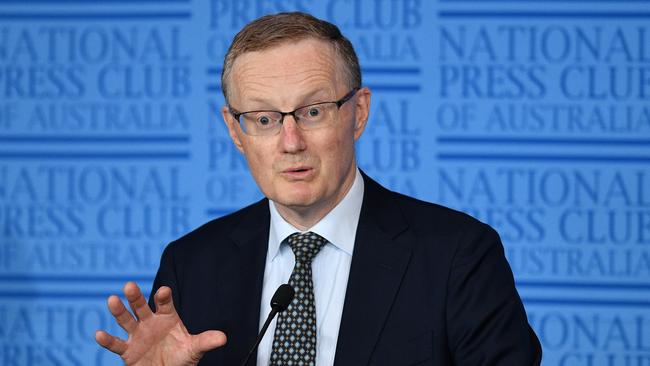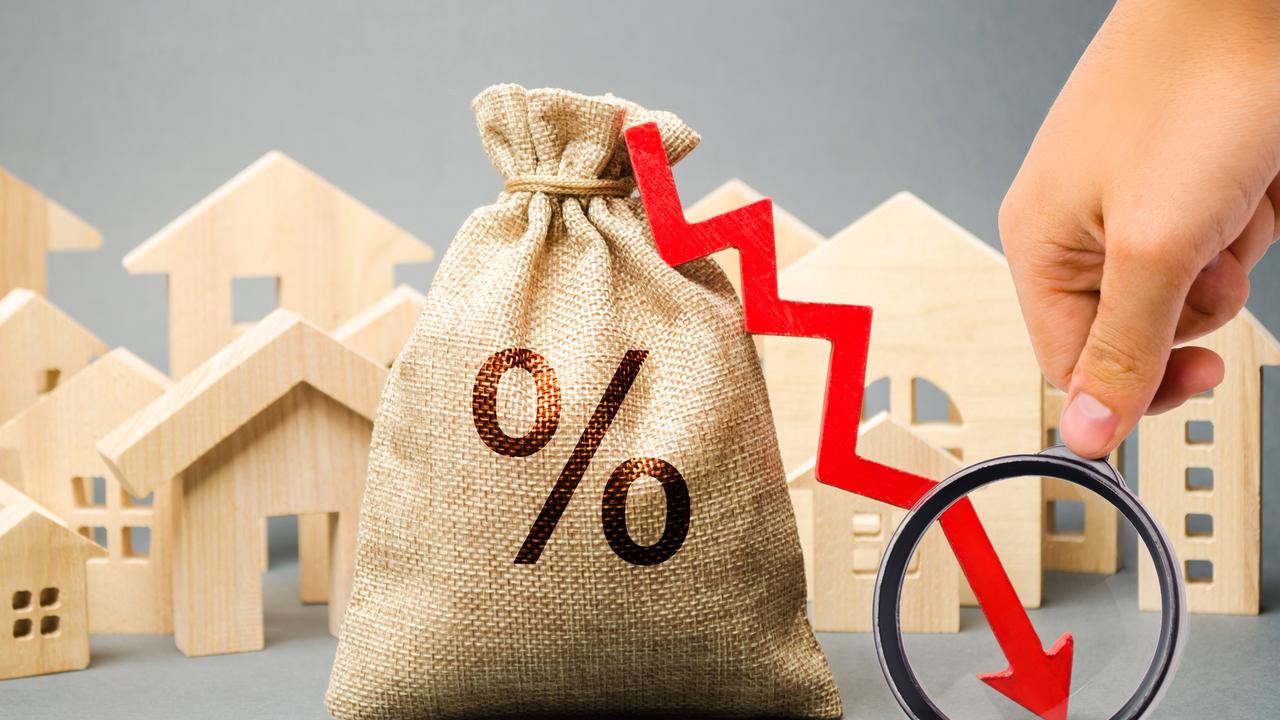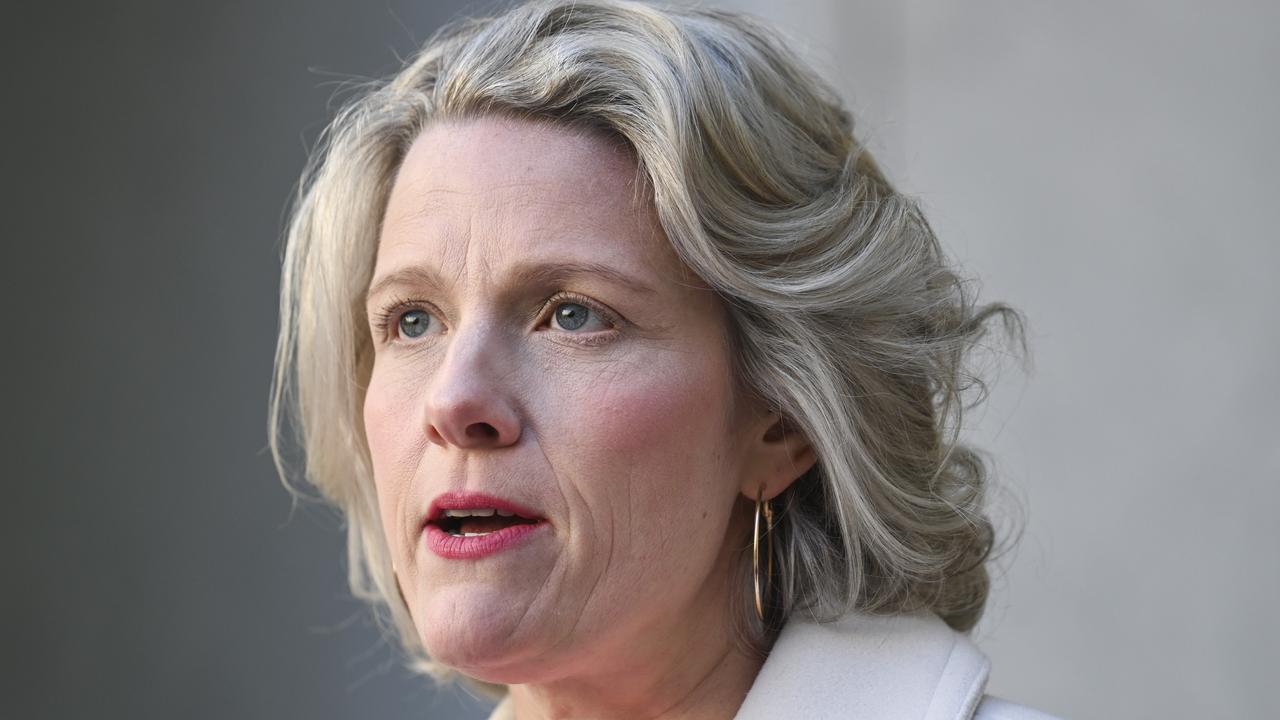Rate cut looms on RBA chief Philip Lowe’s radar
Philip Lowe has warned of economic headwinds as the RBA abandoned its long-held position that interest rates would rise.

Reserve Bank governor Philip Lowe has warned of economic headwinds after the central bank abandoned its long-held position that interest rates would rise and slashed official growth forecasts in a pre-election surprise that underscores fears the planned budget surplus may evaporate.
Financial markets are bracing for the RBA to cut official interest rates to a new record low of 1.25 per cent by early next year, as the accelerating slide in house prices in Sydney and Melbourne dampens consumer spending and analysts predict a slowdown in the Chinese economy.
Dr Lowe’s speech in Sydney yesterday, the first major address by the central bank boss this year, sent the Australian dollar diving.
“Over the past year, the next-move-is-up scenarios were more likely than the next-move-is-down (interest rates) scenarios,” Dr Lowe said. “Today, the probabilities appear to be more evenly balanced.”
The worsening outlook came after a run of negative economic data, including a collapse in business conditions and sentiment, falling house prices, a slide in new home loan approvals, weak retail sales and a drop in job advertisements.
The RBA’s central forecast for the local economy is now to expand by 3 per cent this year and 2.75 per cent in 2020.
“These forecasts are lower than the ones we published three months ago,” Dr Lowe said.
Scott Morrison is attempting to claw back votes from Labor with a campaign based on the government’s economic management, centred on delivering the first budget surplus in a decade in April ahead of an expected election in May.
However, the slowdown in the world economy is threatening the budget environment, and global macroeconomic consultant Fitch Solutions has warned that the government would “struggle to register a federal fiscal surplus next financial year” because of deteriorating economic conditions at home and abroad.
Josh Frydenberg yesterday reaffirmed the budget would return to surplus and that the “fundamentals” of the economy were strong. “But as the Prime Minister and I have warned, there are storm clouds hanging over the global economy, which is why we need to stick to our plan for a stronger economy,” the Treasurer said.
Opposition Treasury spokesman Chris Bowen slammed the “latest downgrade” to economic forecasts on the government’s watch.
“The governor also made it clear that to help insure us against future downturns we need appropriate fiscal buffers, which is exactly why we’ve made difficult calls that help to put the budget on a more structurally sound footing,” Mr Bowen said.
Dr Lowe said the government’s planned tax cuts should support household income growth over the next two years, but he urged the government to return the budget to balance “over time”.
“One day we will have a downturn and we will want a fiscal response,” he said.
“Getting the budget back to balance on a reasonable timescale is part of that.”
The RBA has expressed concern for some time over a potential credit crunch, sparked by a slowdown in lending by the banking sector, which came under pressure over irresponsible mortgage selling during the royal commission.
Dr Lowe yesterday said royal commissioner Kenneth Hayne’s final report would return “some” certainty to the credit market.
“The commission’s recommendations that bear on credit provision are balanced and sensible,” he said.
Following the publication of Mr Hayne’s final report, bank stocks have surged on the prospect of reignited credit growth.
Commonwealth Bank chief executive Matt Comyn yesterday said there were “clearly” risks to the global economy, including Brexit, trade wars and a slowing of the US economy, while Australia was vulnerable to the sliding housing market and falling rates of construction.
“Certainly my base case view is that the economy will continue to perform well,” Mr Comyn said. “We remain optimistic, acknowledging the risks to the downside.”
Deloitte Access Economics’ Chris Richardson said the biggest threat to Australia was an implosion in the Chinese economy, and the risk the local housing market slide “picks up pace and starts to impact the wider economy”.
While national house prices have fallen more than 6 per cent since mid-2017, with steeper falls in Sydney and Melbourne, Dr Lowe said he expected further falls in the Sydney market.
Mr Richardson said the RBA was acknowledging that concerns that the weakening housing environment could spiral out of control had risen over the past two months.
“The housing price fall that we had to have has happened pretty safely so far,” Mr Richardson said.
For the moment, Australia is benefiting from stimulus in China as it tries to kickstart its faltering economy, which is helping drive export prices higher for key commodities, such as iron ore and coal.
Dr Lowe said the housing market was softening due to a downturn in demand from overseas investors; the building boom catching up to population growth; high property prices turning off investors; and some tightening of bank lending standards.
“At this point, though, what we are seeing looks to be a manageable adjustment in the housing market,” Dr Lowe said. “It is not expected to derail economic growth. The previous trends in debt and housing prices were becoming unsustainable and some correction was appropriate.
“Even after the recent declines in Sydney, prices are still 75 per cent higher over the decade. In Melbourne, they are 70 per cent higher.”
Dr Lowe said the outlook for interest rates rested a lot on conditions in the job market, where unemployment has fallen to 5 per cent — its lowest level in more than six years.
“We will be monitoring developments in the labour market closely,” he said.


